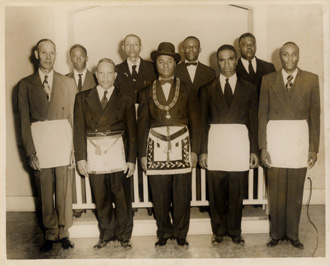Story of Prince Hall Masons revealed
Through an exhibition celebrating the 150â“year existence of the African American fraternal organization known as the Prince Hall Grand Lodge Free and Accepted Masons of Louisiana, the Amistad Research Center sheds light on the role that Masons played in politics, civil rights and education.

Trinity Lodge No. 175 in West Monroe, La., circa 1950. (Photo from the Amistad Research Center at Tulane University)
“The importance of these records coming to Amistad is not only the fact that they will now be secure and preserved,” says Lee Hampton, executive director of the research center. “They also will become accessible to researchers and scholars seeking information about things such as the Masons' relationship to the civil rights movement.”
Artifacts, photographs, membership records and standards for admission into the brotherhood are all part of the collection. An undated handbook shows that members must be 21 years of age, of sound mind and body, able to fulfill the financial obligations of membership, loyal citizens and a believer in the “great architect of the universe.”
The exhibit was co-curated by Melissa Smith, an Amistad project archivist, and Laura Thomson, the center's director of processing.
Smith says that one of the most exciting finds was a letter to the National Urban League from the Masons' grand master explaining a bus boycott in Baton Rouge, La. several years before the 1955 Montgomery boycott involving Rosa Parks.
“I have never seen Negroes demonstrate so fully and completely that they are tired of being pushed around,” the 1953 letter begins. It lists a donation of $6,484.16 from The Defense League to provide free rides to all bus patrons. There were 135 personal cars providing transportation.
“These are the stories we want to tell,” says Smith. “The stories that didn't make headlines, but had just as much of an impact on the movement.”
